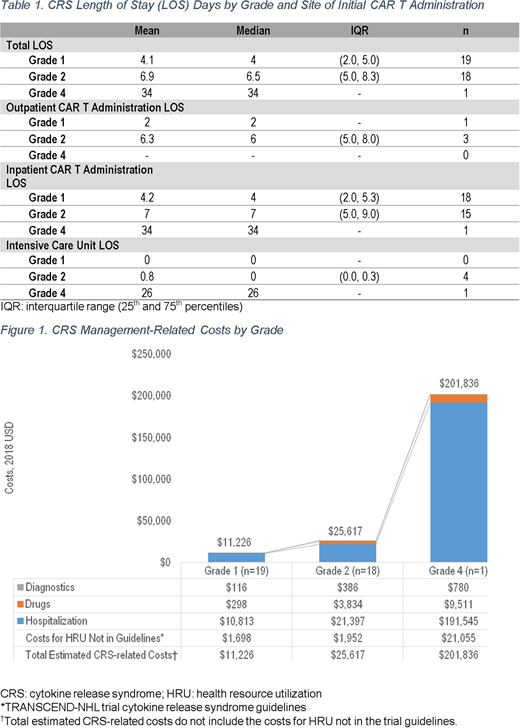Abstract

INTRODUCTION: Information on the differential resources and costs associated with managing treatment-related adverse events (TRAEs) from chimeric antigen receptor T-cell (CAR T) therapies, including cytokine release syndrome (CRS), have not been estimated and may differ by therapy. Lisocabtagene maraleucel (liso-cel; JCAR017) is a CD19-directed 4-1BB CAR T cell product administered in a defined composition at a precise 1:1 dose of CD8 and CD4 CAR T cells. TRANSCEND-NHL 001 is a multicenter seamless design pivotal phase 1 trial of liso-cel in R/R B-NHL (NCT02631044). The objectives of this analysis were to estimate the cost of CRS management observed in the TRANSCEND-NHL trial and to compare the CRS treatment with the trial's management guidelines.
METHODS: Case report forms detailed health resource utilization (HRU) related to CRS management among patients treated in the TRANSCEND-NHL trial who experienced CRS. CRS was graded per Lee et al. 2014. A two-step micro-costing method was used to identify resource use and estimate costs associated with CRS. Step 1 included analyzing HRU for managing each event, including number of inpatient days, number of intensive care unit (ICU) days, procedures (e.g. lab work, imaging, biopsy), and medications. HRU that occurred within the TRAE onset date and resolution date was included. Step 2 involved applying costs to each HRU. The base-case analysis included only HRU collected among patients from the TRANSCEND-NHL trial that was in accordance with trial's CRS management guidelines for each specified grade.
Scenario analysis included HRU not specified in the guidelines. Unit costs were from the health system perspective and were adjusted to 2018 USD. Cost per inpatient day ($2,668) was estimated from HCUP Databases, and cost per ICU day ($6,546) was sourced from Dasta et al. 2005. Medication cost data are from REDBOOKTM using wholesale acquisition cost. Diagnostic and procedure costs are from the Centers for Medicare & Medicaid Services lab fee schedule and physician fee schedule, respectively. Analyses are stratified by grade and by site of care (inpatient or outpatient) at which the CAR T cell therapy was administered.
RESULTS: CRS occurred in 38 of 102 patients treated in the dose-finding/dose-expansion portions of the TRANSCEND-NHL clinical trial. Among the 38 patients, 19 patients experienced grade 1, 18 grade 2, and 1 grade 4 CRS. Total HRU and cost differed between CRS grades. Length of stay (LOS) associated with CRS management by grade are shown in Table 1. Median and average LOS increased with higher CRS grades. Mean LOS for grades 1 and 2 were 4 and 7 days, respectively. One patient with grade 4 had a 34-day LOS. No patients with CRS grade 1 were transferred to the ICU, and the mean ICU LOS for CRS grade 2 patients was 1 day. Mean LOS was longer among patients who were administered CAR T therapy in the inpatient setting (6.3 days) compared with the outpatient setting (5.3 days). Patients in TRANSCEND-NHL were successfully managed with conservative health resource utilization compared with the guidelines. For instance, while the trial management guidelines suggest tocilizumab for patients with Grade 2 CRS, this was administered to only half of Grade 2 CRS patients (9/18, 50%).
Total cost is driven by LOS and for grades 1 and 2 CRS ranged from $11,226 to $25,617. LOS represented 94.4% and 83.5% of total cost in grades 1 and 2, respectively. The one CRS grade 4 patient incurred a 34-day LOS, contributing 94.9% of an estimated total cost of $201,836. Resource use not referenced in the guidelines was largely comprised of medication use and resulted in minimal increases in total cost. Costs due to resource use outside of the guidelines ranged from $1,698 to $21,055. The total cost of CRS management is reported in Figure 1.
CONCLUSIONS: The results of this analysis show that hospital and ICU LOS are key drivers of CRS management cost and are mainly associated with managing grade 3/4 CRS. These results are based on national average costs; actual costs may vary between hospitals. The incidence of CRS and management guidelines vary across CAR T therapies and will affect both HRU and associated cost differences. CRS management is also contingent on patient characteristics. The biology of CAR Ts and resultant safety profile of the various products will likely drive dissimilarities in CRS management and cost.
Siddiqi:Juno Therapeutics: Other: Steering committee. Garcia:Juno Therapeutics, a fully owned subsidiary of Celgene: Employment, Equity Ownership. Dehner:Juno Therapeutics, a fully owned subsidiary of Celgene: Employment, Equity Ownership. Nguyen:Juno Therapeutics: Consultancy. Gitlin:Juno Therapeutics: Consultancy. Chung:Juno Therapeutics: Employment. Abramson:Verastem: Consultancy; Amgen: Consultancy; Novartis: Consultancy; Bayer: Consultancy; Juno Therapeutics: Consultancy; Gilead: Consultancy; Celgene: Consultancy; Karyopharm: Consultancy; Merck: Consultancy; Humanigen: Consultancy; Seattle Genetics: Consultancy.
Author notes
Asterisk with author names denotes non-ASH members.

This icon denotes a clinically relevant abstract


